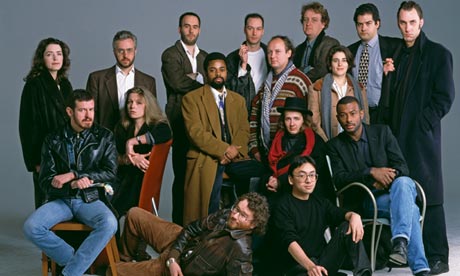As the new list of Granta's Best of Young British Novelists is published, being a novelist has never been so confusing.
Some of Granta's Best of Young British Novelists 1993. Photograph: David Montgomery/Getty Images
Representatives of the book industry from all over the world will converge on Earl's Court for the London Book Fair on Monday; the briskest of trades in international rights is the fair's primary purpose, but in between their back-to-back half-hour appointments, the publishers, agents, retailers and auxiliary publishing professionals also need to be entertained and informed. Workshops, panel discussions, seminars and interviews abound, their subjects ranging from cover design, children's literature, film adaptations and anything and everything to do with Turkey, this year's featured country.
In the digital zone, you might attend sessions with titles such as "e to eternity", "Project Managing Digital Assets" and "The Future is HTML5", which can only be more fascinating than it sounds. The really keen will go along today to the Digital Minds conference, described as "a must-attend precursor" to the fair proper, at which the keynote address will be given by award-winning novelist Neil Gaiman. Its subject? "Exploring models of online storytelling and reader engagement."
Fast forward to Tuesday morning, when another panel will convene to discuss Granta's Best of Young British Novelists list, the fourth of these once-a-decade snapshots of hot, youngish (under 40) talent, which will be announced on Monday. Having helped to judge the last list and having perhaps foolhardily made my predictions for this round, I've been invited to take part in the event. And whatever the selection, there's one aspect of the list that I feel confident will come up in the discussion: what kind of landscape are these writers coming of age in? In the years to come, will there be readers to read their books? How will they read them? And, most crucially, will they want to pay for them?
Anyone who says they can read the runes of the modern publishing industry is either deluded or a charlatan – and possibly both. It was hardly a stable picture when the last BOYBN list came out, added to which, publishing, like many industries, revels in tales of its own demise. But whether or not one sees the situation as mired in doom and gloom or poised on the brink of iconoclastic rejuvenation, it is certainly in furious flux.
If confirmation were needed, it came last week from one of bookselling's most famous figures. Tim Waterstone, who founded the chain that still bears his name in 1982 before selling it in the 1990s, announced his involvement in an e-book company called Read Petite, which will publish short-form fiction and non-fiction of fewer than 9,000 words or so and sell it via monthly subscription. In an interview with the Guardian, Waterstone was fairly upbeat about the view from the high street, yet many will feel he hit the nail on the head with this concise summary of the challenges facing bricks-and-mortar retailers: "The arithmetic does get more and more difficult."
Having been owned by WH Smith and then HMV, Waterstones now belongs to Russian businessman Alexander Mamut, who appointed James Daunt, already the owner of the small London chain Daunt Books, as its managing director. Daunt's own shops cater for a certain type of book-buyer: they are elegant spaces filled with high-end reading material and staffed with knowledgeable and enthusiastic booksellers. They ooze discernment and, as their locations in Chelsea, Holland Park and Marylebone suggest, they have an undeniable class association. They are not pile-'em-high, sell-'em-cheap merchants.
Full piece
In the digital zone, you might attend sessions with titles such as "e to eternity", "Project Managing Digital Assets" and "The Future is HTML5", which can only be more fascinating than it sounds. The really keen will go along today to the Digital Minds conference, described as "a must-attend precursor" to the fair proper, at which the keynote address will be given by award-winning novelist Neil Gaiman. Its subject? "Exploring models of online storytelling and reader engagement."
Fast forward to Tuesday morning, when another panel will convene to discuss Granta's Best of Young British Novelists list, the fourth of these once-a-decade snapshots of hot, youngish (under 40) talent, which will be announced on Monday. Having helped to judge the last list and having perhaps foolhardily made my predictions for this round, I've been invited to take part in the event. And whatever the selection, there's one aspect of the list that I feel confident will come up in the discussion: what kind of landscape are these writers coming of age in? In the years to come, will there be readers to read their books? How will they read them? And, most crucially, will they want to pay for them?
Anyone who says they can read the runes of the modern publishing industry is either deluded or a charlatan – and possibly both. It was hardly a stable picture when the last BOYBN list came out, added to which, publishing, like many industries, revels in tales of its own demise. But whether or not one sees the situation as mired in doom and gloom or poised on the brink of iconoclastic rejuvenation, it is certainly in furious flux.
If confirmation were needed, it came last week from one of bookselling's most famous figures. Tim Waterstone, who founded the chain that still bears his name in 1982 before selling it in the 1990s, announced his involvement in an e-book company called Read Petite, which will publish short-form fiction and non-fiction of fewer than 9,000 words or so and sell it via monthly subscription. In an interview with the Guardian, Waterstone was fairly upbeat about the view from the high street, yet many will feel he hit the nail on the head with this concise summary of the challenges facing bricks-and-mortar retailers: "The arithmetic does get more and more difficult."
Having been owned by WH Smith and then HMV, Waterstones now belongs to Russian businessman Alexander Mamut, who appointed James Daunt, already the owner of the small London chain Daunt Books, as its managing director. Daunt's own shops cater for a certain type of book-buyer: they are elegant spaces filled with high-end reading material and staffed with knowledgeable and enthusiastic booksellers. They ooze discernment and, as their locations in Chelsea, Holland Park and Marylebone suggest, they have an undeniable class association. They are not pile-'em-high, sell-'em-cheap merchants.
Full piece

